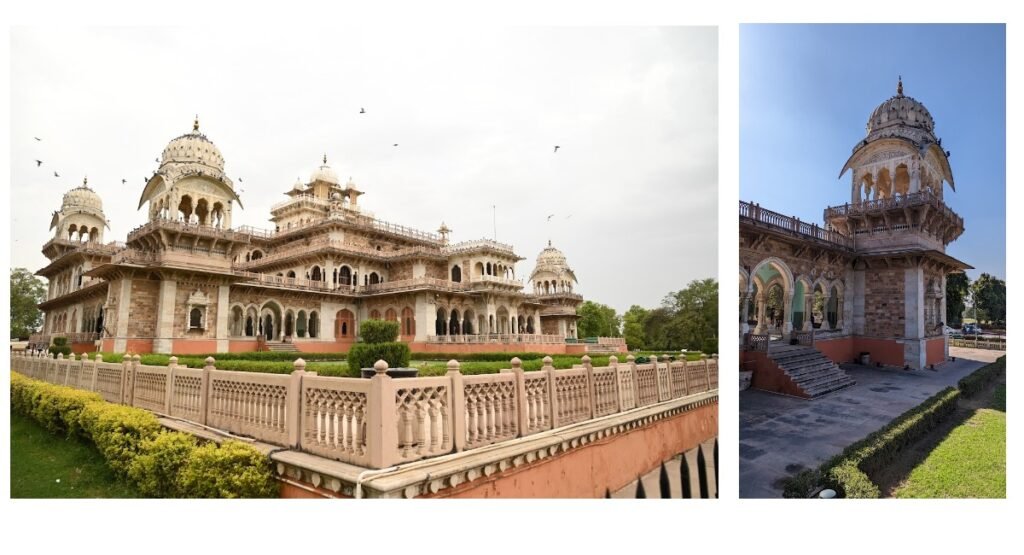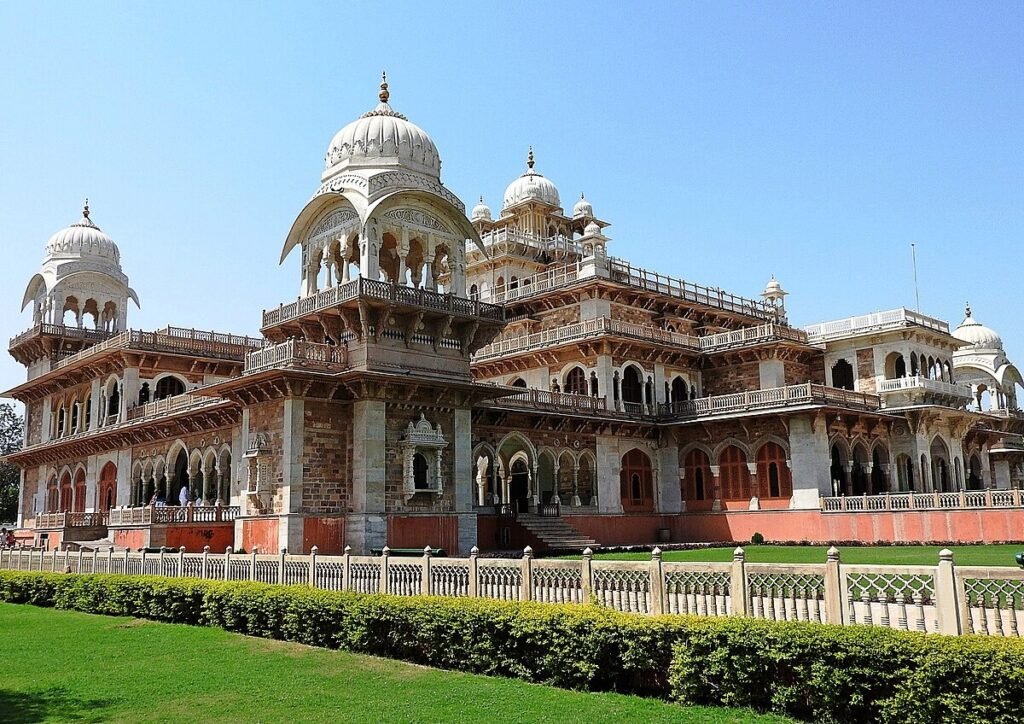Albert Hall Museum, Jaipur, stands as a majestic testimony to Rajasthan’s rich heritage and culture.
Albert Hall Museum, nestled in the heart of Jaipur, is more than just a historical monument; it is a vibrant window into Rajasthan’s art, culture, and enduring traditions. Built in the late 19th century, it attracts tourists with its stunning Indo-Saracenic architecture, remarkable collections, and immersive visitor experiences. Whether you are a history buff, an architecture enthusiast, or a traveller, this timeless museum promises a journey through the stories of Jaipur.
History of Albert Hall Museum
The Albert Hall Museum’s origin dates back to 1876, when Prince Albert Edward (later King Edward VII) laid the foundation stone during his visit to Jaipur. Maharaja Sawai Ram Singh II commissioned the structure, initially intending it as a town hall. Eventually, Maharaja Sawai Madho Singh II, inspired by a vision to promote local art and craft, transformed it into a museum and opened it to the public in 1887.
British architect Samuel Swinton Jacob, along with Mir Tujumool Hoosein, designed the museum in the celebrated Indo-Saracenic style, a fusion of Indian, Islamic, and Gothic elements. Colonel Thomas Holbein Hendley curated the collections, sourcing rare artefacts and pioneering visitor-friendly practices, such as guided tours, reserving Fridays for women, and organising regular exhibitions.
The museum’s roots trace back to the 1883 Jaipur Exhibition, which showcased the craftsmanship of local artisans. Over time, its collection has evolved, yet the founders’ vision of preserving and promoting the essence of Rajasthan remains vibrant.
Tourist Experience
The Albert Hall Museum welcomes thousands of visitors each year and is a must-visit attraction in Jaipur. Practical visitor details include:
The museum’s location in Ram Niwas Garden offers visitors a tranquil atmosphere with lush greenery, a perfect spot for picnics, walks, and relaxation after the museum tour.
Cultural Significance
Albert Hall Museum is a vital preserver and promoter of Rajasthan’s culture. The museum serves not only as a repository of history but also as a lively hub of cultural exchange. It embodies the spirit of colonial diplomacy, where British architectural influences blend harmoniously with local tradition, creating a legacy celebrated across generations.
From its inception, the Albert Hall Museum broke barriers, encouraging public engagement through guided tours, supporting women’s access, and nurturing crafts through regular events. Today, it continues these traditions, organising art workshops, heritage walks, and cultural performances that enrich Jaipur’s social tapestry.
Architectural Grandeur
Albert Hall Museum is an architectural marvel. Built in the unique Indo-Saracenic style, the building features:
- Majestic domes, ornate arches, and intricately carved balconies
- Exquisite stone carvings, murals, and stained glass windows
- An elegant facade inspired by the Victoria and Albert Museum in London
Designed by Samuel Swinton Jacob, the museum’s symmetrical layout and lush surroundings in Ram Niwas Garden make it a photographer’s delight and a centrepiece of Jaipur’s urban landscape.
Collections and Galleries
Albert Hall Museum boasts 16 main galleries, each curated to immerse visitors in a distinct aspect of history and artistry. Highlights include:
- Egyptian Mummy: One of India’s rare mummy displays, dating back to 1883
- Persian Golden Carpet: Acquired from Shah Abbas of Persia, renowned for its craftsmanship
- Ancient Coins Collection: Spanning the Gupta, Sultanate, and Mughal dynasties
- Metalwork, Marble Art, Woodwork, and Pottery: Showcasing Rajasthan’s traditional crafts
- Arms and Armour, Jewellery, Carpets, Textiles: Reflecting royal legacy and artistry
The museum also displays garments, musical instruments, miniatures, puppets, and Henna body art, offering a sweeping view of life and traditions across eras.
Revenue and Recent Developments
The Albert Hall Museum is a major revenue generator for Jaipur’s tourism industry. With ticket sales, audio guide rentals, events, and exhibitions, it makes a significant contribution to the city’s cultural economy. Renovated in 2008, it now features modern amenities, including multimedia displays, audio guides, and a souvenir shop, to enhance the visitor experience.
Recent news highlights the museum’s expanding focus on rare artefacts, community engagement, and educational programs. Regular exhibitions showcase local crafts, supporting artisans and cultural preservation, and attracting both domestic and international tourists.

Route and How to Reach
Albert Hall Museum’s central location makes it accessible from all parts of Jaipur and nearby cities:
- By Rail: Jaipur Junction Railway Station is just 5 km away; Merta Road Junction is nearby.
- By Road: Well-connected by city buses, taxis, and auto-rickshaws.
- By Air: Jaipur International Airport is around 11 km from the museum.
- Local Transport: Cab aggregators, city buses, and cycle rickshaws are recommended options.
Visitors can enjoy a smooth transit to Ram Niwas Garden and easily spot the museum’s grand edifice near Adarsh Nagar.
FAQs About Albert Hall Museum, Jaipur
What is the Albert Hall Museum famous for?
The Albert Hall Museum is renowned for its Indo-Saracenic architecture, rare artefacts like the Egyptian mummy and Persian carpet, and its extensive collection from Rajasthan’s history.
What are the museum’s opening and closing hours?
It is open from 9:00 AM to 5:00 PM, and for night visits from 7:00 PM to 10:00 PM.
How much is the entry fee?
Entry fees are ₹40 for Indian nationals and ₹300 for foreigners; student discounts and audio guides are available.
Is photography allowed in the museum?
Photography is permitted in most areas, except select galleries where restrictions apply to protect artefacts.
How do I reach the museum?
Located in Ram Niwas Garden, Albert Hall Museum is accessible by auto-rickshaw, taxi, bus, or private car from major transport centres in Jaipur.
Which artefacts are must-sees?
Don’t miss the Egyptian mummy, Persian carpet, ancient coins, blue pottery, traditional musical instruments, and Rajasthani costumes.
What are the best months to visit?
From October to March, the weather is pleasant, with special discounts and events on heritage days.
Does the museum host cultural events?
Yes, you can attend art workshops, folk dance performances, puppet shows, and heritage walks on a regular basis.
Conclusion
Albert Hall Museum, Jaipur, is a mesmerising blend of heritage, art, and living tradition. Its historic legacy, rich cultural tapestry, and engaging visitor experience make it one of India’s top travel destinations. Whether exploring its halls, participating in cultural performances, or walking through lush gardens, every visit here is a celebration of Rajasthan’s glorious past and vibrant present.
For tourists, academics, culture seekers, and everyone in between, Albert Hall Museum remains a must-visit, capturing the soul of Jaipur and presenting a splendid journey worth remembering.
